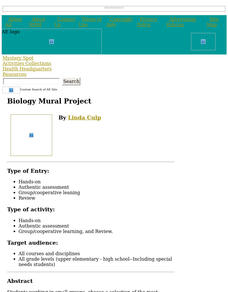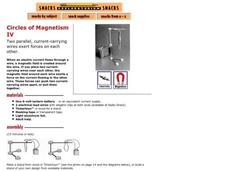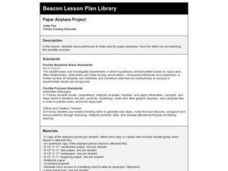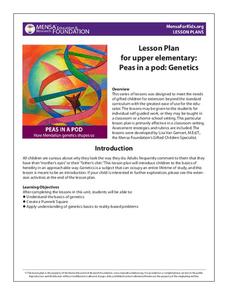Baylor College
What Is a One Part Per Million Solution?
Water may appear to be crystal clear, but there could be dissolved substances present. Lab groups make a one-part-per-million of a food coloring solution to demonstrate this concept. As part of an outstanding unit about water, this...
Baylor College
Heart and Lungs
With a partner, youngsters measure their pulse and breathing rates, both at rest and after running in place for a minute. While this activity is not novel, the lesson plan includes a large-scale classroom graphing activity and other...
Baylor College
Dust Catchers
In class, your emerging environmentalists construct dust catchers. They take them home for a week or two, and then bring them back into class to examine under a magnifier. From this activity, they learn what makes up dust and that...
Baylor College
Moving Air
In lab groups, young scientists place aluminum cans with a bubble-solution cap into different temperatures of water to see what size of bubble dome forms. As part of an atmosphere unit in preparation for learning about convection...
Baylor College
Magnifying and Observing Cells
Though it isn't a novel activity to prepare onion cell and Elodea plant cell slides as examples of cells in a microbiology unit, this resource will leave you thoroughly prepared. As pupils examine the slides that they prepare, they draw...
California Academy of Science
Kinesthetic Astronomy: Moon Phases
We are the world! Each of your class members models Earth and holds a styrofoam ball to see its phases. Thorough teacher background information and a detailed lesson plan will make this a cinch to teach. If you do not want to purchase...
Curated OER
Biology Mural Project
Students express knowledge in an unconventional mode which encourages creativity, analytical skills and cooperation within a group. This lesson stimulates pride in students because they are able to showcase their abilities.
Exploratorium
Circles of Magnetism IV
Hang a strip of foil on a stand and form a loop out of it. Then attach the clips of a battery-operated circuit to the loop to see its sides repel each other. This simple demonstration is applicable and easy to add to your lecture on...
Curated OER
Vegetable Flowers with Homemade Ranch Dip
Vegetables aren't just things we can grow to eat; now they are things we can grow to create art! Use this cute and kid-friendly recipe during your next Earth Day celebration. It includes step-by-step instructions on how to turn...
UAF Geophysical Institute
Observing the Weather
How can you predict the weather without any technology? Young scientists learn to forecast the weather using traditional Native American techniques. Based on their observations of the weather, as well as talking to their classmates, they...
Curated OER
How Gear Systems Work: A Research Project
Students apply information regarding simple machines along with the math concept "ratios." The teacher introduces the concept that technology is the application of scientific knowledge and mathematics concepts to solve a problem. This is...
Curated OER
Fabric Scrap Flower Garden
Crafting is fun, it increases eye-hand coordination, and it is a great way to accent any lesson. Celebrate Earth Day by creating scrap fabric flowers for a pop-stick flower garden. Children of all ages will love gluing, cutting, and...
Baylor College
Microbes Are Everywhere
In a nutshell, your class will culture bacteria from their choice of surfaces. You will need to prepare or purchase agar plates. If you are new to this classic biology activity, this resource carefully walks you through the process of...
Safe Drinking Water Foundation
To Filter or Not to Filter
Drinking clean water can be taken for granted. Explore the process and high cost of filtering water with a water pollution and filtration activity. Young scientist build a filtration system to filter polluted water, examine the economics...
Curated OER
Ecosystems
A critical look into the structure and function of ecosystems is here for young learners as a series of lessons and worksheet activities. Topics covered include land-based and marine ecosystems, connections to the water cycle, food webs,...
NOAA
Satellite Communications
How do satellites communicate? What types of satellites orbit Earth? Discover and mimic the way satellites communicate between two points in a hands-on activity that has pupils using mirrors, flashlights, and marbles.
MENSA Education & Research Foundation
Peas in a Pod: Genetics
Can peas have grandparents? Learn about inherited traits and heredity with a set of activities focused on Mendelian genetics. As your class learns about the process of passing traits along in Punnett squares, they take on the role of...
Busch Gardens
Create an Invertebrate
What better way for young biologists to learn about invertebrates than by creating their very own? Here, students are assigned a set of invertebrate characteristics and are asked to invent an imaginary ocean animal and a separate...
Curated OER
African Savanna Habitat Diorama Craft
Set the stage for a unit or lesson on the African savanna by creating a cute habitat diorama. Cheetahs, lions, zebras, and elephants are all present in a shoe-box-sized craft that requires your learners to color, cut, and paste. These...
Foundation for Water & Energy Education
What is the Water Cycle? Activity B
Curious physical scientists follow a lesson on the properties of water with this lesson on distillation. They observe a miniature water cycle model that filters dirty water into clean water. These two lessons combined are an enriching...
Organic Farming
Four Seasons
Celebrate the changing of the seasons with this collection of arts and crafts activities.
National Science Teachers Association
Adopt-a-Dino
Earth historians research a specific dinosaur, write a paper about the Mesozoic era that it lived in, create an artistic rendition of the environment, and give a presentation in class about what they learned. Be aware that there are...
Baylor College
About Air
Give your class a colorful and tasty representation of the components of the mixture that we call air. Pop a few batches of popcorn in four different colors, one to represent each gas: nitrogen, oxygen, argon, and carbon dioxide. The...
Other popular searches
- 4th Grade Science Project
- Physical Science Projects
- Science Project on Pulleys
- Science Project Volcano
- Science Project Gravity
- Science Project Ideas
- Forensic Science Project
- Science Fair Project Ideas
- Rock Science Project
- Science Project Food
- Science Project Terrarium
- Science Fair Project Data

























